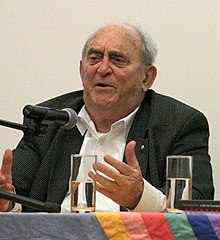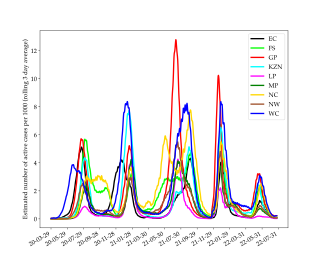| |||||
| Decades: | |||||
|---|---|---|---|---|---|
| See also: | |||||
Events in the year 2020 in South Africa .
| |||||
| Decades: | |||||
|---|---|---|---|---|---|
| See also: | |||||
Events in the year 2020 in South Africa .
The Cabinet, together with the President and the Deputy President, forms the Executive.




Kenneth Rasalabe Joseph Meshoe is a South African evangelist, politician, reverend and teacher. He has been serving as the inaugural leader of the African Christian Democratic Party, a Christian democratic political party, since 1993. He became a Member of Parliament in 1994 and has since been re-elected five times. He is one of the longest-serving MPs.

Matamela Cyril Ramaphosa is a South African businessman and politician serving as the 5th and current President of South Africa since 2018. A former anti-apartheid activist and trade union leader, Ramaphosa is also the president (leader) of the African National Congress (ANC).

Nkosazana Clarice Dlamini-Zuma, sometimes referred to by her initials NDZ, is a South African politician, medical doctor and former anti-apartheid activist. A longstanding member of the African National Congress (ANC), she currently serves as a Chancellor of the University of Limpopo.

South Africa since 1994 transitioned from the system of apartheid to one of majority rule. The election of 1994 resulted in a change in government with the African National Congress (ANC) coming to power. The ANC retained power after subsequent elections in 1999, 2004, 2009, 2014, and 2019. Children born during this period are known as the born-free generation, and those aged eighteen or older, were able to vote for the first time in 2014.

The African National Congress (ANC) has been the governing party of the Republic of South Africa since 1994. The ANC was founded on 8 January 1912 in Bloemfontein and is the oldest liberation movement in Africa.
Andrew Mokete Mlangeni, also known as Percy Mokoena, Mokete Mokoena, and Rev. Mokete Mokoena, was a South African political activist and anti-apartheid campaigner who, along with Nelson Mandela and others, was imprisoned after the Rivonia Trial.

Zindziswa "Zindzi" Mandela, also known as Zindzi Mandela-Hlongwane, was a South African diplomat and poet, and the daughter of anti-apartheid activists and politicians Nelson Mandela and Winnie Madikizela-Mandela. Zindzi was the youngest and third of Nelson Mandela's three daughters, including sister Zenani Mandela.

Stella Tembisa Ndabeni-Abrahams is a South African politician who is currently serving as the Minister of Small Business Development since 5 August 2021. She previously served as Minister of Communications and Digital Technologies from November 2018 to August 2021. She is a member of the National Executive Committee (NEC) and a National Working Committee (NWC) of the African National Congress (ANC).
The following lists events that happened during 2018 in South Africa.

Mathume Joseph Phaahla is a South African politician who is currently serving as the Deputy Minister of Health since July 2024. He was formerly the Minister of Health between August 2021 and May 2024. A member of the National Executive Committee of the African National Congress (ANC), he has been a deputy minister since May 2009, when he joined the National Assembly; he served an earlier stint as Deputy Minister of Health between May 2014 and August 2021.

The COVID-19 pandemic in South Africa was part of the pandemic of coronavirus disease 2019 (COVID-19) caused by the severe acute respiratory syndrome coronavirus 2 (SARS-CoV-2).
The following lists events that happened during 2020 in Southern Africa. The countries are those described in the United Nations geoscheme for Africa.
Clarence Mazwangwandile Mini was a South African doctor, anti-apartheid activist, freedom fighter, human rights activist. Mini was regarded as a pioneer of the medical industry in South Africa, especially for his crucial contributions in eliminating the HIV/AIDS from the country. He also actively advocated against apartheid during his career and also voiced against corruption which mounted during the presidency of Jacob Zuma. He served on the Board of Healthcare Funders, at times as its chair. He died on 12 May 2020 due to COVID-19 complications at the age of 68 while serving as the chairperson of the Council of Medical Schemes. His term as chairperson of CMS was due to end by September 2020.

Africa's first confirmed case of COVID-19 was announced in Egypt on 14 February 2020. Many preventive measures have been implemented in different countries in Africa, including travel restrictions, flight cancellations, event cancellations, school closures, and border closures. Other measures to contain and limit the spread of the virus has included curfews, lockdowns, and enforcing the wearing of face masks. The virus has spread throughout the continent. Lesotho, the last African sovereign state to have remained free of the virus, reported a case on 13 May 2020.
Events in the year 2021 in South Africa.
Nocawe Noncedo Mafu is a South African politician currently serving as Deputy Minister of Sports, Arts and Culture. She has been a member of the National Assembly since 2014. She was Chairperson of the Portfolio Committee on Human Settlements from 2014 to 2019. Mafu is a member of the African National Congress.
Events in the year 2022 in South Africa.
This article is about the timeline of events during the COVID-19 pandemic in South Africa which was part of the ongoing pandemic of coronavirus disease 2019 (COVID-19) that was first recorded in South Africa on 1 March 2020. Since that date the pandemic has hit the country in four waves.
Events in the year 2023 in South Africa.